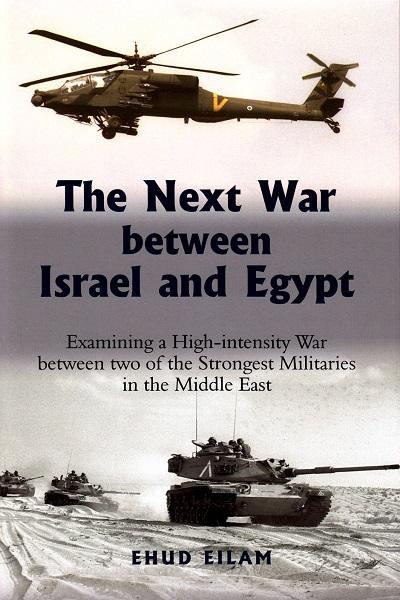
A recently published book by Ehud Eilam, named "The Next War between Israel and Egypt: Examining a High-intensity War between Two of the Strongest Militaries in the Middle East", examines principles of modern conventional warfare in the Middle East.
The purpose is to present a model of such a war by analysing how Egypt and Israel might encounter each other. They would collide on the same old battlefield of their former wars, i.e. the frontline again would be the Sinai Peninsula and the campaign would be a conventional one.
The book evaluates key military factors in land; air and sea combat in a future showdown between two of the strongest militaries in the Middle East, those of Israel and Egypt. The purpose is not to create one overall scenario of the next war between the two states, but to examine each aspect separately in order to highlight its importance.
The next war between Israel and Egypt would be based on many familiar factors from past confrontations, including the Arab – Israeli wars, such as a fight for air superiority, air – ground bombardments, ground combat between tanks and infantry etc. Defense in depth or forward defense in the Sinai would also be an important issue.
There would be new military factors as well. The demilitarizing of the Sinai means that neither side would have military infrastructure in the entire peninsula. Furthermore it would be the first showdown between Israel and Egypt when both militaries are founded on thousands of U.S. weapons systems.
Views on the Book
“Eilam’s comprehensive, intriguing and important research on a possible high intensity war between Israel and Egypt is essential for understanding challenges both states might face.”
Brig. Gen. (res.) Dr. Dani Asher, IDF Collages
“Dr. Ehud Eilam successfully explains in this book the operational issues involved in the buildup and performance of Israel's armed forces. Eilam’s accurate analysis of the challenges of modern warfare and his conclusions based on past wars, elucidate the military complexity of a vast and multi-dimensional arena. I strongly recommend this book.”
Brig. Gen. (ret.) Alon Friedman, former Chief of Staff of the IDF's Northern Command
“Ehud Eilam’s study tells the detailed story of more than thirty years of the conventional armed conflict between Egypt and Israel. He brings an original analysis and research tools which could help understanding the complexity of this confrontation in the past as well as in the future.”
Dr. Zeev Drori, Col. (ret.), Kinneret College, Israel
“Eilam presents a very cogent, judicious and compelling analysis of what the future military confrontation between Israel and Egypt in Sinai could look like.”
Hillel Frisch, Professor of Political and Middle East Studies, Bar-Ilan University
“In this interesting and thought-provoking treatment of the Egyptian–Israeli balance of power, Ehud Eilam describes in minute detail how such a war might unfold in the air, on the ground, and at sea…Eilam’s command of the historical facts surrounding Israel’s wars, as well as that of concepts connected to strategy, operations, tactics, and technology, is not in dispute. Furthermore, his methodology—to rely on the past as a guide to the future—is certainly reasonable. What other methodology, after all, could promise to deliver more reliable conclusions?”
David Rodman, Independent analyst of Israeli defense and diplomatic policy. From the review that was published in the Israel Journal of Foreign Affairs, 2015 Vol. 00, No. 00, 1–2.
"Eilam’s argument is based on a sound historical understanding of previous armed clashes and their implications for future struggles. Nearly all his book’s chapters proceed from historical background to contemporary and possible future issues. Eilam draws on his personal knowledge1 and a meticulous reading of unclassified Israeli government and military documents, reports and articles by journalists and civilian experts…The Next War between Israel and Egypt is a suggestive, well-informed study that will appeal to military and political experts, scholars interested in high-intensity warfare, specialists in modern Middle Eastern military history, and university students and professors of history. It provides a good starting point for serious reflection on the possibility and likely nature of war between two American armed military forces."
Prof. Eyal Ben-Ari, Kinneret College on the Sea of Galilee. From the review that was published in the Michigan war studies review, June 2015.
"This is an excellent book whose title really doesn't do it justice. What Dr. Eilam has done is give a sophisticated analysis of the options available to both Israel and Egypt should another war break out. He does this systematically and combines a historic approach (i.e. examining the five previous wars between these two states) with one cognizant of ongoing technological developments. While an Israeli, Dr. Eilam's approach is critical and unbiased.This is the best conflict analysis book I've seen published since the 1980s when scholars such as Barry Posen, John Mearshimer and Joshua Epstein produced their brilliant analyses of how a NATO/Warsaw Pact conflict would look.I hope Mr. Eilam gives us a sequel."
Marc DeVore holds a Ph.D. in political science from the Massachusetts Institute of Technology (MIT). He works in the University of St Andrews. See his review in Amazon, September 2015.
“A mind-provoking exercise…. Eilam's book asks good questions, and will be of interest for military planners and wargamers.”
Dr. Yagil Henkin, Military Historian and Lecturer at the IDF Command and Staff College
"Eilam examines how the battle for air superiority, air–ground bombardment, armour, and infantry collisions would shape the outcome of the conflict. The analysis draws on previous (mainly Arab–Israeli) conflicts and the author’s twenty years of studying Israel’s national strategy and military doctrine."
From the 'Commander Canadian Army's Reading List 2015', p. 24
No comments:
Post a Comment